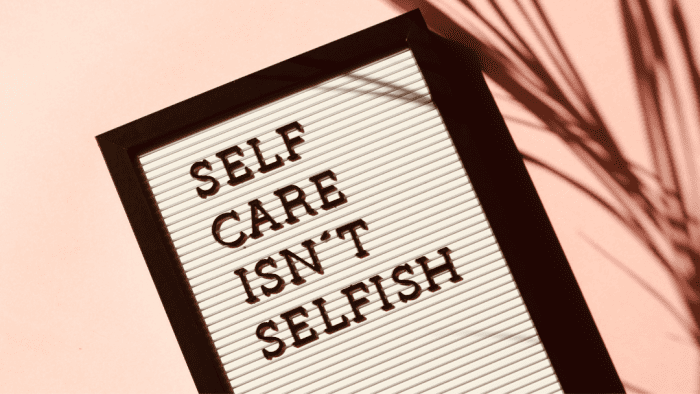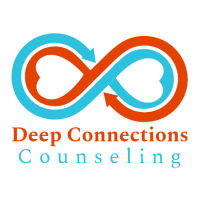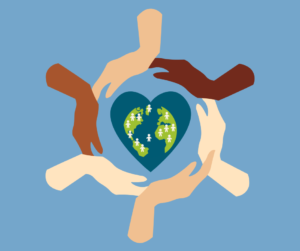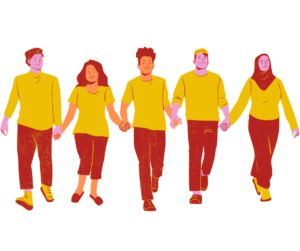Nearly half of all Americans deal with a mental health issue at least once in their lives, yet the conversation around mental health remains stigmatized. Stigma causes people to feel shame towards themselves for something that they have no real control over, a self-directed antipathy that you might experience in your own life.
Here at Deep Connections Counseling, we believe it is our job as mental health professionals to ensure that the conversation around mental health is healthy and productive. We are working to deconstruct the mental health stigma through educating people about the realities of mental health issues while treating and healing those who need it with compassion.
You may think of the mental health stigma as being an overall toxic mentality for our society. And this is true! But we often overlook the impact that stigmas and preconceived notions have on our own mental health.
In this post, we will offer some insight into how we can shift our often-unconscious internal beliefs about mental health and learn to embrace rather than stigmatize it.
The Stigma Around Mental Health
What Is It?
Our present society has come far from the “mental issues equal insanity” mentality that anchored our conversation to the dark ages for much of the twentieth century. Both the scientific community and the general public have advanced in understanding depression and other mental illnesses.
Despite this, we still see them stigmatized heavily.
Where Does It Come From?
A stigma around mental health probably comes from a general misunderstanding of what mental illness is and what it means to struggle with a mental illness.
Recognizing and standing up to mental health stigma is a holistic approach to connecting with and giving a voice to your own mental health, which may be suffering in silence.
Share Your Mental Health Journey With Others
One of the best ways to shine light on a stigmatized issue is by talking openly, honestly, and shamelessly about it.
Sharing your mental health journey with those around you can bring empowerment both to you and others. Bringing your experiences to light can disprove harmful stereotypes about mental illnesses and encourage others to speak up or seek help.
How Does Sharing My Journey Help Me Feel Better?
Oftentimes, we allow radical thoughts to bounce around in our brain, never processing them but allowing them to cause damage to our psyche. But it has actually been shown through clinical psychological research that being present and processing your emotions by formulating your thoughts into words is the most natural way to deal with mental strife.
In other words: talk it out. See how much it helps you. Sharing your stories and challenges with mental health can be an opportunity to externalize your struggles. Which, in turn, can help you see that it’s okay to struggle.
It’s like having shaken up a soda bottle and slowly twisting that cap off to let some of the pressure out.
One of the most proven effective strategies for sharing your story is with a licensed therapist. Here at Deep Connections Counseling, our therapists are experts in the field of mental health psychotherapy, and we know how to combat a stigmatizing world.
Educate Yourself and Others About Mental Health
If you suffer from mental health problems, you’ve likely overheard conversations or remarks stigmatizing mental illnesses.
Your natural reaction in these situations may be to keep your head down and stay quiet. But this is a mistake. Allowing these incorrect beliefs to pass by unquestioned only gives them more power.
Instead, you need to make your voice heard. Explain why they are incorrect. And how damaging these kinds of statements can be to someone living with mental illnesses – especially to our youth, who can be more vulnerable to the damage of stigma.
How Does Education Help My Journey with Mental Health Struggles?
Education can be the structurally and functionally powerful bridge to a more understanding and reconciling society for individuals with mental health illnesses. It brings light to issues that daunt struggling populations so that others outside of this population can learn how to reduce the social stigma of mental health.
It can be the tool to reduce any shame you might feel about your mental illness. Oftentimes, we see ourselves as “the mentally ill,” rather than “an individual with a mental illness.”
Learning to continue to identify yourself as an individual who exists outside of your mental health struggles is the first step to getting others to see the whole person. In contrast, viewing yourself as your diagnosis reduces the complexity of your struggles.
Learn to recognize and love yourself outside of your mental illness and urge others around you to do the same if you suspect that they see your diagnosis as the defining factor of your identity.
Also, be conscious of your language. Avoid hurtful labels that aim to label your mental health experience such as “weird,” “strange,” or “crazy.”
Learn to rephrase sentences that pin blame on yourself. Rather than saying you’re depressed, identify yourself as an individual with a complex diagnosis of depression.
It may seem awkward or unnatural at first. But realizing that you are just as valuable with or without mental health struggles is the first step in embracing your mental health.
What If You’re Not Ready to be So Open About Your Mental Health Yet?
Maybe interpersonal communication about your mental illness is something that scares you. If so, don’t worry!
If sharing with others in person seems too far-fetched at this point in your journey, here are some websites where you can share your stories with more anonymity:
Take time to gather your thoughts and share them on a social media platform. Or as a private story with a close group of friends. Use your story to disprove harmful stereotypes of mental illness and encourage others to speak up and seek help.
The mental health professionals at Deep Connections Counseling recognize the importance of embracing your mental health and how this can drastically change your life. Learn more about our therapists and get started on your new journey into healing.

Kinga Gudor, PhD
Kinga is a Licensed Clinical Social Worker (LCSW) with more than 15 years of experience. She specializes in couples therapy and working with individuals from a multicultural background.











